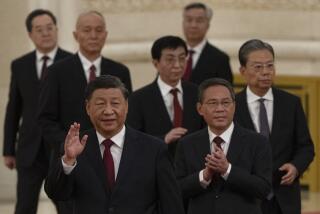Deng Revives Plan for Political Reform in China
- Share via
BEIJING — Chinese leader Deng Xiaoping said Thursday that a “tentative plan for political reform” in China will be made public next fall during a national congress of the Chinese Communist Party.
During a meeting with Canadian Governor General Jeanne Sauve, Deng said the political reform will be “aimed at creating a stable and sustained situation.” He also underscored the continuing importance of China’s opening to the outside world and said the open-door policies will themselves help bring about political change.
Deng’s remarks represented an apparent attempt to regain the initiative against traditionalists within the Communist Party who have been challenging his leadership in the two months since Deng’s longtime aide and protege, party General Secretary Hu Yaobang, was forced to resign.
One of those more traditional party leaders, Chinese President Li Xiannian, told a group of Japanese visitors March 3 that “the leadership of the Chinese Communist Party is a collective, and no one is allowed to go against this collective.” Those remarks were widely interpreted as an attack on Deng’s pre-eminence within the party.
Law on Party Shelved
In another indication of the deep divisions within the Chinese political leadership, it was announced Thursday that a proposed law defining the proper role of the Communist Party within the nation’s state-owned enterprises is being temporarily shelved.
The draft law was supposed to be submitted to the annual session of the National People’s Congress, China’s legislature, which convenes next week. But members of the NPC’s Standing Committee disagreed on the extent to which factory managers should be allowed to operate independently of Communist Party secretaries within their enterprises.
The Communist Party’s reform wing had favored a law removing the party as much as possible from the job of running factories. But conservatives had sought language in the draft law that would guarantee a continuing role for party organizations within state-owned industries.
The failure to get a new law enacted means that there will be continuing uncertainty over the legal authority of party officials and factory managers in Chinese enterprises.
Last year, with the encouragement of Chinese leaders, Chinese intellectuals wrote a spate of articles exploring the need for reform of the nation’s political system.
The articles by the intellectuals called for checks and balances on the power of the Communist Party, for greater recognition of the right to dissent and for greater democracy in China.
Deng’s Stand Defined
Deng himself never endorsed these ideas. In early September, he spoke of the need for political reform but gave the concept an extremely narrow definition, one that did not include limits on the power of the Communist Party. He said political reform meant that China should eliminate bureaucracy and that “our party should be good at leadership.”
At the beginning of this year, the talk of political reform virtually disappeared from the speeches of Chinese leaders. Along with the ouster of Hu, the regime fostered a new insistence on adherence to what are called the “four cardinal principles”--Marxism, socialism, the dictatorship of the proletariat and the rule of the Communist Party.
Deng gave few specifics Thursday on his ideas for political reform, but he did suggest that he favors greater decentralization of power.
“Only by stepping up the domestic economy, especially by granting more decision-making power to grass-roots units, can China give full play to the enthusiasm of the people and units nationwide,” he said, according to the account by the official New China News Agency.
Meanwhile, in what was apparently another attempt to shore up Deng’s leadership position, the New China News Agency announced that a new edition of Deng’s speeches and writings will be distributed throughout China today.
More to Read
Sign up for Essential California
The most important California stories and recommendations in your inbox every morning.
You may occasionally receive promotional content from the Los Angeles Times.













